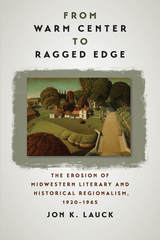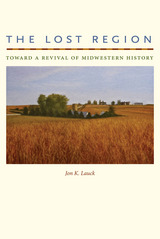2 books about Lauck, Jon K.

From Warm Center to Ragged Edge
The Erosion of Midwestern Literary and Historical Regionalism, 1920-1965
Jon K. Lauck
University of Iowa Press, 2017
During the half-century after the Civil War, intellectuals and politicians assumed the Midwest to be the font and heart of American culture. Despite the persistence of strong currents of midwestern regionalism during the 1920s and 1930s, the region went into eclipse during the post–World War II era. In the apt language of Minnesota’s F. Scott Fitzgerald, the Midwest slid from being the “warm center” of the republic to its “ragged edge.”
This book explains the factors that triggered the demise of the Midwest’s regionalist energies, from anti-midwestern machinations in the literary world and the inability of midwestern writers to break through the cultural politics of the era to the growing dominance of a coastal, urban culture. These developments paved the way for the proliferation of images of the Midwest as flyover country, the Rust Belt, a staid and decaying region. Yet Lauck urges readers to recognize persisting and evolving forms of midwestern identity and to resist the forces that squelch the nation’s interior voices.
This book explains the factors that triggered the demise of the Midwest’s regionalist energies, from anti-midwestern machinations in the literary world and the inability of midwestern writers to break through the cultural politics of the era to the growing dominance of a coastal, urban culture. These developments paved the way for the proliferation of images of the Midwest as flyover country, the Rust Belt, a staid and decaying region. Yet Lauck urges readers to recognize persisting and evolving forms of midwestern identity and to resist the forces that squelch the nation’s interior voices.
[more]

The Lost Region
Toward a Revival of Midwestern History
Jon K. Lauck
University of Iowa Press, 2013
The American Midwest is an orphan among regions. In comparison to the South, the far West, and New England, its history has been sadly neglected. To spark more attention to their region, midwestern historians will need to explain the Midwest’s crucial roles in the development of the entire country: it helped spark the American Revolution and stabilized the young American republic by strengthening its economy and endowing it with an agricultural heartland; it played a critical role in the Union victory in the Civil War; it extended the republican institutions created by the American founders, and then its settler populism made those institutions more democratic; it weakened and decentered the cultural dominance of the urban East; and its bustling land markets deepened Americans’ embrace of capitalist institutions and attitudes.
In addition to outlining the centrality of the Midwest to crucial moments in American history, Jon K. Lauck resurrects the long-forgotten stories of the institutions founded by an earlier generation of midwestern historians, from state historical societies to the Mississippi Valley Historical Association. Their strong commitment to local and regional communities rooted their work in place and gave it an audience outside the academy. He also explores the works of these scholars, showing that they researched a broad range of themes and topics, often pioneering fields that remain vital today.
The Lost Region demonstrates the importance of the Midwest, the depth of historical work once written about the region, the continuing insights that can be gleaned from this body of knowledge, and the lessons that can be learned from some of its prominent historians, all with the intent of once again finding the forgotten center of the nation and developing a robust historiography of the Midwest.
[more]
READERS
Browse our collection.
PUBLISHERS
See BiblioVault's publisher services.
STUDENT SERVICES
Files for college accessibility offices.
UChicago Accessibility Resources
home | accessibility | search | about | contact us
BiblioVault ® 2001 - 2024
The University of Chicago Press









